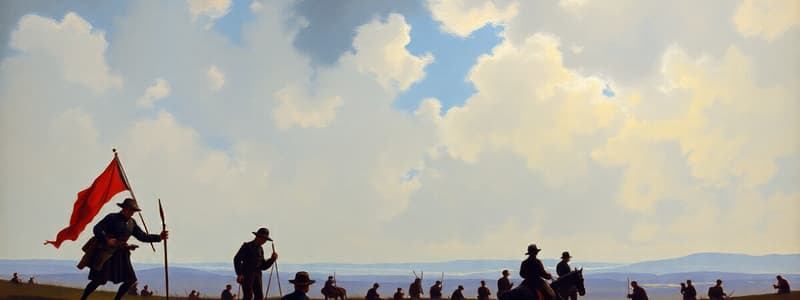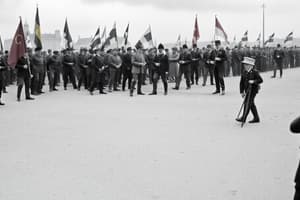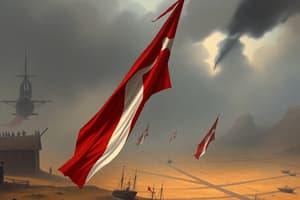Podcast
Questions and Answers
Which of the following factors did not significantly contribute to the outbreak of World War I?
Which of the following factors did not significantly contribute to the outbreak of World War I?
- A complex web of alliances that obligated nations to defend one another, escalating regional conflicts.
- The rising tide of popular nationalism across Europe, fostering a sense of competition among nation-states.
- Industrialized militarism, which created a hair-trigger mentality and incentivized striking first.
- Widespread pacifist movements that weakened the resolve of European powers to engage in conflict. (correct)
How did the assassination of Archduke Franz Ferdinand trigger a wider conflict involving multiple European powers?
How did the assassination of Archduke Franz Ferdinand trigger a wider conflict involving multiple European powers?
- It triggered a series of economic sanctions against Serbia, which then retaliated by attacking major European capitals.
- It caused the immediate collapse of the Austro-Hungarian Empire, creating a power vacuum that other nations rushed to fill.
- It prompted Austria-Hungary to declare war on Serbia, activating a system of alliances that drew in other nations. (correct)
- It directly led to Germany declaring war on France and Russia, because they were allied with Serbia.
What role did colonial territories play in World War I beyond the European continent?
What role did colonial territories play in World War I beyond the European continent?
- They supplied troops and laborers to the war effort and became battlegrounds in some cases, expanding the conflict's reach. (correct)
- They served primarily as neutral buffer zones where European powers could negotiate peace treaties.
- They became havens for refugees fleeing war-torn Europe, offering humanitarian aid and resources.
- They were largely unaffected by the war, maintaining pre-war economic and political relationships.
How did the existing balance of power in Europe contribute to the environment that led to the First World War?
How did the existing balance of power in Europe contribute to the environment that led to the First World War?
How did industrialized militarism shape the nature of World War I weaponry and tactics?
How did industrialized militarism shape the nature of World War I weaponry and tactics?
What was the primary goal of the alliance system in Europe prior to World War I, and why did it fail?
What was the primary goal of the alliance system in Europe prior to World War I, and why did it fail?
What impact did World War I have on the social roles and expectations of women, based on the information provided?
What impact did World War I have on the social roles and expectations of women, based on the information provided?
How did the rise of Germany as a powerful, industrialized nation impact the existing European political landscape?
How did the rise of Germany as a powerful, industrialized nation impact the existing European political landscape?
Which long-term consequence of World War I is most directly supported by the information?
Which long-term consequence of World War I is most directly supported by the information?
What does the text suggest about the role of public opinion in the lead-up to World War I?
What does the text suggest about the role of public opinion in the lead-up to World War I?
Which of the following best describes the relationship between nationalism and militarism in Europe prior to World War I?
Which of the following best describes the relationship between nationalism and militarism in Europe prior to World War I?
How did the 'war plans' developed by European powers contribute to the escalation of the conflict?
How did the 'war plans' developed by European powers contribute to the escalation of the conflict?
How did rivalries and competition among European nation-states shape the alliances that defined the start of World War I?
How did rivalries and competition among European nation-states shape the alliances that defined the start of World War I?
What motivated the United States to abandon its initial policy of avoiding involvement in European affairs and enter World War I?
What motivated the United States to abandon its initial policy of avoiding involvement in European affairs and enter World War I?
What factor contributed most to the staggering casualty rates experienced during World War I?
What factor contributed most to the staggering casualty rates experienced during World War I?
Flashcards
Rise of New Powers
Rise of New Powers
New nations like Italy and Germany arose, disrupting the balance of power.
Triple Alliance and Entente
Triple Alliance and Entente
Two major alliances formed: the Triple Alliance (Germany, Italy, Austria-Hungary) and the Triple Entente (Russia, France, Britain).
Archduke's Assassination
Archduke's Assassination
The assassination of Archduke Franz Ferdinand triggered a chain reaction due to these alliances.
System of Alliances
System of Alliances
Signup and view all the flashcards
Mounting Nationalism
Mounting Nationalism
Signup and view all the flashcards
Industrialized Militarism
Industrialized Militarism
Signup and view all the flashcards
New Military Technology
New Military Technology
Signup and view all the flashcards
Global Impact of War
Global Impact of War
Signup and view all the flashcards
US Entry into WWI
US Entry into WWI
Signup and view all the flashcards
Study Notes
- Europe's transformation and global power didn't lead to unity, but instead heightened rivalries among nation-states.
- Germany's rapid industrialization and ambition disrupted the European balance of power, especially for Britain, France, and Russia.
- Two rival alliances formed: the Triple Alliance (Germany, Italy, Austria-Hungary) and the Triple Entente (Russia, France, Britain).
- The assassination of Archduke Franz Ferdinand, heir to the Austro-Hungarian throne, by a Serbian nationalist triggered World War I.
- Austria-Hungary aimed to crush Serbian nationalism, backed by Germany; Serbia was supported by Russia, France, and Britain due to alliances.
- The alliance system, meant for peace, led to obligations that drew major European powers into a general war by August 1914.
- Mounting nationalism in Europe fueled the war, with schools and media creating strong national identities and popular support for conflict.
- Industrialized militarism, military prestige, conscription, and detailed "war plans" contributed to a hair-trigger mentality and the war's outbreak.
- New military technology, including submarines, tanks, airplanes, poison gas, and machine guns, led to staggering casualties, with 10 million deaths and twice as many wounded.
- Colonial troops and laborers from Africa, India, China, Southeast Asia, Australia, New Zealand, and Canada were involved in the war effort.
- British and French forces seized German colonies in Africa and the South Pacific; Japan took German possessions in China and the Pacific.
- The Ottoman Empire joined Germany, leading to military actions and an Arab revolt; the United States joined in 1917 due to German submarine threats.
Studying That Suits You
Use AI to generate personalized quizzes and flashcards to suit your learning preferences.




